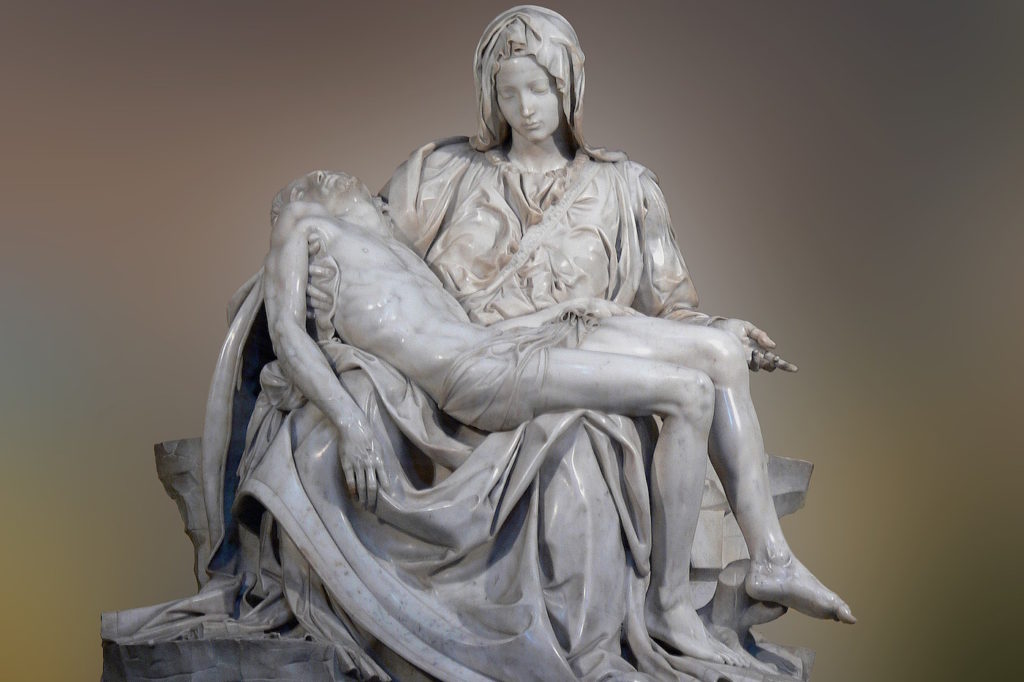Conservatism has no shortage of indictments—both accurate and insightful—against the contemporary West. Our elevation of individual rights to the detriment of social obligations has vitiated our pursuit of the common good. Shallow emotivism, sophistry, and manipulative rhetoric are undermining our tradition of disinterested intellectual inquiry, and are silencing all those who oppose the new order. Global technological totalitarianism is profiting the secularist, technocratic elite at the expense of everyone else.
Between 1965 and 1973, the German Catholic philosopher Josef Pieper wrote a remarkably prescient set of essays—recently republished together as The Weight of Belief—that identified these threats to the West’s survival. To confront these challenges, Pieper calls us to return to the virtue of pietas: the humble acceptance and performance of one’s obligations to society and to God.
Rights and Obligations
Pieper presents the classical understanding of pietas in opposition to the modern, libertarian conception of how individuals relate in society. Pre-modern philosophers, from Aristotle and Cicero to Augustine and Aquinas, understood justice first through the prism of obligations: the duties one has to others rather than the rights that are one’s own. As Socrates asserts in Plato’s dialogues, “He who commits an injustice is worse off than he who suffers injustice.”
Start your day with Public Discourse
Sign up and get our daily essays sent straight to your inbox.This is not to say that one ought not also to demand one’s own rights, but only that to assert one’s rights is essentially a defensive mode of human society, while to start from obligation is audacious, aggressive, and realistic. It is audacious and aggressive because it expects more of the individual; it is realistic because, if people first consider what they owe others, their neighbor’s well-being follows more reliably than in a society grounded only on rights.
This shift moves society’s conversation away from the divisive debate over individual rights to a much broader, unifying project of determining what is due to man. This dialogue must assume that man is created by God, the ultimate authority—a truth attested not only in the West, but also in the East. The Chinese Mandate of Heaven, for example, rested on the famous aphorism, “Heaven loves the people, and the rule must obey Heaven.” When man turns his eyes heavenward, he quickly recognizes his need to give the Creator His due. The ancients responded to this primal insight with sacrifice, a token attempt to level the score with Heaven.
Yet man can never tell God, “Now we’re even!” The gift of life, and God’s many other blessings, cannot be “paid back.” An analogous insight applies to our human relationships. We cannot “pay back” all we owe to our parents, teachers, doctors, and everyone else who contributes to the public good. This is the reason for pietas.
The lack of pietas is the cause of much inhumanity in the world. When people regard themselves as atomized individuals, with no obligations to their fellow men, they exhibit little sympathy for others. This explains the libertarian, twenty-first-century American ethos that shrugs its shoulders at epidemics of addiction to opioids or pornography: many value the right to determine their own truth and destiny more than the welfare of their neighbor.
We increasingly recognize that a culture that first asks, “What are my rights?” dehumanizes its citizens. Instead, it must ask, “What do I owe to others?”
Sophistry: Turning Language into an Instrument of Power
A robust exercise of pietas would also address the emotive sophistry of our day, by reorienting us away from cynicism and toward transcendent truth. Socrates defined sophistry as disconnecting words from reality. This “indifference toward the truth” detaches words from the “true nature of things,” and treats them as instruments of power. We find a contemporary form of sophistry in Michel Foucault’s thesis that knowledge is never disinterested, but always serves power, or in Jacques Derrida’s skepticism about humans’ capacity to understand the true meaning of texts.
To embrace sophistry is to stop respecting one’s hearers as human persons, and to scorn our obligations to our fellow citizens. Every word of the sophist becomes a base attempt to manipulate others in order to maximize one’s power. We find such exploitation in advertisers’ use of flattery and cajoling, or in how social media encourage us to cultivate a public persona, and to obsess over how others perceive us. Ironically, advertisers and the broader media also appeal to the contemporary desire to “be real,” a fact that suggests we still yearn for authenticity.
Sophistry reduces language to a “power structure”: a means of marginalizing or eliminating enemies by discrediting them as “racists,” “homophobes,” or “sexists.” It doesn’t matter if the labels actually obtain, Pieper explains:
Once the word . . . has, as a matter of principle, been rendered neutral to the norm of truth, it is, by its very nature, a ready-made tool just waiting to be picked up by “the powers that be” and “employed” for violent or despotic ends.
In a sophistic society, people are “cowed by the threat of criticism, of character assassination, of subjection to public ridicule, or being ‘passed over’ for promotion, and so on.” In our own day, if the mainstream media only ask the question “is so-and-so a racist/sexist?” it may end a person’s career.
Perhaps ground zero of this sophistry is the university, where language is an “instrument of force” in many different ways. On the one hand, snowflake students claim that certain words or ideas—if simply spoken aloud or written—are a form of “violence” that does inestimable damage to their well-being. On the other hand, these same students declaim ideologically charged tirades to defame and silence their opponents, be they non-conformist students, professors, or visiting speakers. This language war has resulted in a “public loss of the ability to know reality,” as we are “surrounded by illusory realities whose fictitious character is threatening to become wholly undetectable!”
The proper response to this is to speak in accordance with objective truth, whose “natural habitat is human conversation.” This is an important part of pietas, because one of the most fundamental obligations we owe our fellow citizens is the truth. Individuals, and by extension institutions, must cultivate forums where “people can inquire into, discuss, and assert the truth of things without let or hindrance.” Any society must foster “total openness or candor” in its members in order that they may find and articulate “the whole of reality” and so discover our obligations. This candor is inherently “antisophistical”: it opposes “bias and oversimplification, ideological fervor, all forms of blind emotionalism,” and rejects arbitrary terminology that vilifies one’s enemy. Indeed, one’s interlocutor, no matter how contentious, is still a fellow citizen; one still owes him the truth (and charity).
Resisting Global Technological Totalitarianism
The person that has pietas can also make better sense of our digital age and its excesses. He recognizes that technology offers opportunities for great progress, but that it can also seduce, enslave, and change the human person. This threat is all the more real in a globalized world where “‘islands no longer exist.” As various institutions—governments, corporations, wealthy global NGOs—exert more influence thanks to technological advancements, persons “may no longer attach much importance to the residuum of freedom which lies between them and absolute control,” to quote Wilhelm Röpke. By means of pietas one recognizes that, although technology may free us, it may just as easily enslave us, and make us incapable of fulfilling our obligations to our fellow man.
This “scientific dictatorship,” as Aldous Huxley put it, “painlessly regimented by a corps of highly trained social engineers,” promotes sophistry. The reason why, says Pieper, is that it relies on “the atrophy of communication between human beings,” and is perpetuated by a “vast communication industry, concerned . . . neither with the true nor the false, but with the unreal, the more or less totally irrelevant.” It also fosters the atomization of society, as we become less aware of or dependent on the persons around us. Pieper here describes with great foresight precisely the reality of contemporary television, social media, smartphones, global supply chains, and the digital “cloud.”
One can limit the totalitarian tendency of “global tech” by becoming a “digital minimalist,” or taking similar measures; but ultimately Pieper recommends that we exercise hope, an important component of pietas. The citizen who practices pietas rejects self-indulgence or nihilism and works for some goal or telos greater than himself and this world. He hopes for “fullness of life, the restoration or healing of man; a homeland; ‘coming home’ . . . the absolute satisfaction of all our needs; beatitude of a kind we have never known before.” A person who possesses such hope can participate in a community even in the midst of catastrophe; he can work for a society whose conception of human happiness transcends materialism and sensuality. This hope fosters a desire for true justice that mirrors the ultimate justice of the “New Earth” of the Book of Revelation.
Pietas: An Antidote for the Challenges of Our Time
Fifty years ago, Josef Pieper accurately prophesied the most defining dilemmas of our age and their dehumanizing tendencies. Thankfully, Pieper did not leave us only with a diagnosis of our ills. He also reminds us of our obligations to our fellow men: to seek truth instead of power; to counteract the destructive, dehumanizing tendencies of technology. In a word, he points us to pietas. Even more, he reminds us that the answer lies not only in our own creativity or resourcefulness, but also in recognizing our need for a transcendent, higher power, to whom we are duty-bound. Pietas, fully realized, orients man to an eternal obligation and hope, one he diligently labors for, though “he knows neither in what hour nor in what form it will finally come.”













